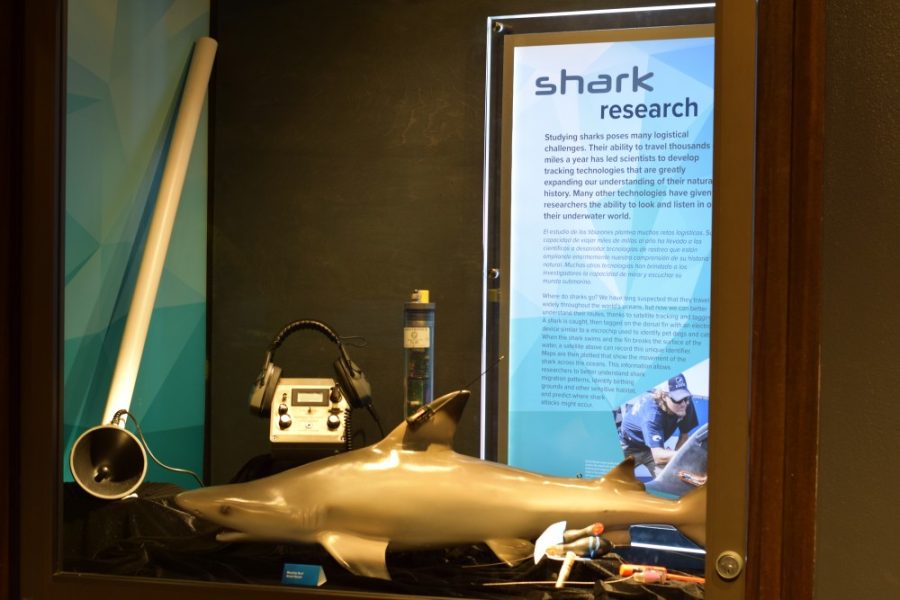The Flandrau Science Center and Planetarium opened its newest exhibit, “Sharks: Magnificent and Misunderstood,” on Friday, Feb. 22.
The exhibit features interactive displays, a deep-sea submarine simulator, information about oceanographers at the University of Arizona, shark jaws, a wall of life-size tail fins and a new full-dome planetarium show.
“Great White Shark“ is a 2013 film directed by Luke Cresswell and Steve McNicholas and narrated by Bill Nighy. The film discusses the fear people have of great whites, their role in the ocean’s food chain, and the main areas where great whites are found.
RELATED: Look to the stars with Flandrau
Alexandra Nieland has worked at Flandrau for three years. She is a shift-lead and has been trained as a planetarium operator.
On Saturday, Feb. 23, Nieland led the 7 p.m. full-dome showing of “Great White Shark” for the first time. She welcomed the crowd before the movie began and led a talk at the end to further discuss sharks and the environmental dangers facing them.
“I was really excited, because I hadn’t seen the shark show, I had only been told about it by one of my really good friends who puts the exhibits together and works a lot here at the planetarium,” Nieland said. “I really wanted to do it. I wanted to see what it was like.”
Nieland is a junior at UA studying environmental science and said she has always been interested in the ocean. She said her favorite part of having the shark exhibit is that it can teach kids about the importance of sharks and conserving them.
“That’s where conservation and the future is, is within kids,” Nieland said.
Kendrick Mayer, a Tucson native and resident, came to the full-dome movie showing with his niece and nephew. He said he had not been to the Flandrau Planetarium in a long time and was interested in seeing the shark film, as well as bringing his niece and nephew, who had never been.
“We’ve always [been] fascinated with sharks, the ocean and ecology,” Mayer said. “Also, for our niece and nephew, we wanted to bring them out here.”
After the showing, Mayer and his niece and nephew went into the shark exhibit portion of the Science Center to explore the displays and learn more about sharks.
Nieland said plans for the shark exhibit had been in the works for a few years, but only the past two and a half months were used to build and set up the exhibit.
“They put it together really quick. There was a very small team of people who built that exhibit,” Nieland said. “It was so cool to see.”
Nieland said the time period exhibits tend to stay in Flandrau is typically two to three years. She said the shark exhibit will likely stay for “two years, minimum.”
From both the movie and the exhibit, Nieland hopes people can learn more about sharks and start to fear them less. She said sharks are like spiders in terms of how people think of them, when in reality they are probably more scared or curious of people than people are of them.
RELATED: ‘Dynamite with a laser bean, guaranteed to blow your mind’
She also said the conservation of sharks is a huge issue and only a few places in the world protect great white sharks, but sharks don’t just stay in those few areas. They travel everywhere.
“I think as a global thing, understanding something helps us fear it less and respect it for what it is,” Nieland said. “Really, that’s what I hope the exhibit does for everybody. To teach people that sharks are important and they’re part of an ecosystem and we don’t decide their intrinsic value.”
“Sharks: Magnificent and Misunderstood” is open to the public at the Flandrau Science Center and Planetarium, which is open every day of the week with varying hours. “Great White Shark” will be showing in the planetarium theater every Wednesday, Friday, Saturday and Sunday until the summer.
For more information on the shark exhibit, movie showtimes, hours of operation and other events going on at the Flandrau Plenetarium, visit their website.
Follow Quincy Sinek on Twitter









